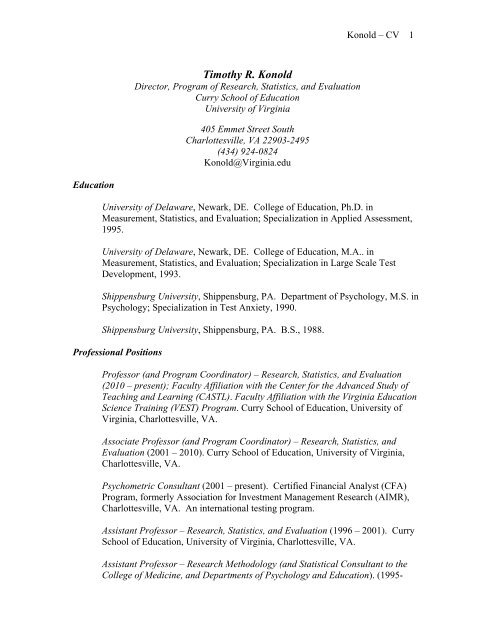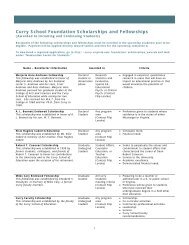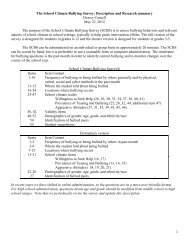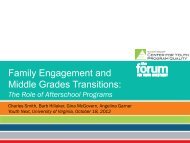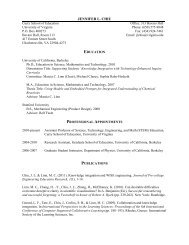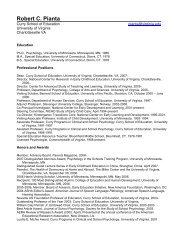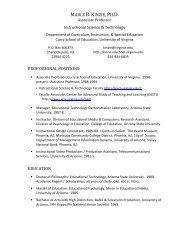Timothy R. Konold - Curry School of Education - University of Virginia
Timothy R. Konold - Curry School of Education - University of Virginia
Timothy R. Konold - Curry School of Education - University of Virginia
You also want an ePaper? Increase the reach of your titles
YUMPU automatically turns print PDFs into web optimized ePapers that Google loves.
<strong>Education</strong><br />
<strong>Timothy</strong> R. <strong>Konold</strong><br />
Director, Program <strong>of</strong> Research, Statistics, and Evaluation<br />
<strong>Curry</strong> <strong>School</strong> <strong>of</strong> <strong>Education</strong><br />
<strong>University</strong> <strong>of</strong> <strong>Virginia</strong><br />
405 Emmet Street South<br />
Charlottesville, VA 22903-2495<br />
(434) 924-0824<br />
<strong>Konold</strong>@<strong>Virginia</strong>.edu<br />
<strong>Konold</strong> – CV 1<br />
<strong>University</strong> <strong>of</strong> Delaware, Newark, DE. College <strong>of</strong> <strong>Education</strong>, Ph.D. in<br />
Measurement, Statistics, and Evaluation; Specialization in Applied Assessment,<br />
1995.<br />
<strong>University</strong> <strong>of</strong> Delaware, Newark, DE. College <strong>of</strong> <strong>Education</strong>, M.A.. in<br />
Measurement, Statistics, and Evaluation; Specialization in Large Scale Test<br />
Development, 1993.<br />
Shippensburg <strong>University</strong>, Shippensburg, PA. Department <strong>of</strong> Psychology, M.S. in<br />
Psychology; Specialization in Test Anxiety, 1990.<br />
Shippensburg <strong>University</strong>, Shippensburg, PA. B.S., 1988.<br />
Pr<strong>of</strong>essional Positions<br />
Pr<strong>of</strong>essor (and Program Coordinator) – Research, Statistics, and Evaluation<br />
(2010 – present); Faculty Affiliation with the Center for the Advanced Study <strong>of</strong><br />
Teaching and Learning (CASTL). Faculty Affiliation with the <strong>Virginia</strong> <strong>Education</strong><br />
Science Training (VEST) Program. <strong>Curry</strong> <strong>School</strong> <strong>of</strong> <strong>Education</strong>, <strong>University</strong> <strong>of</strong><br />
<strong>Virginia</strong>, Charlottesville, VA.<br />
Associate Pr<strong>of</strong>essor (and Program Coordinator) – Research, Statistics, and<br />
Evaluation (2001 – 2010). <strong>Curry</strong> <strong>School</strong> <strong>of</strong> <strong>Education</strong>, <strong>University</strong> <strong>of</strong> <strong>Virginia</strong>,<br />
Charlottesville, VA.<br />
Psychometric Consultant (2001 – present). Certified Financial Analyst (CFA)<br />
Program, formerly Association for Investment Management Research (AIMR),<br />
Charlottesville, VA. An international testing program.<br />
Assistant Pr<strong>of</strong>essor – Research, Statistics, and Evaluation (1996 – 2001). <strong>Curry</strong><br />
<strong>School</strong> <strong>of</strong> <strong>Education</strong>, <strong>University</strong> <strong>of</strong> <strong>Virginia</strong>, Charlottesville, VA.<br />
Assistant Pr<strong>of</strong>essor – Research Methodology (and Statistical Consultant to the<br />
College <strong>of</strong> Medicine, and Departments <strong>of</strong> Psychology and <strong>Education</strong>). (1995-
<strong>Konold</strong> – CV 2<br />
1996). Department <strong>of</strong> Research Methodology, Saint Louis <strong>University</strong>, Saint<br />
Louis, MO.<br />
Instructor <strong>of</strong> Measurement Theory (1991-1995). Department <strong>of</strong> <strong>Education</strong>al<br />
Studies, <strong>University</strong> <strong>of</strong> Delaware, Newark, DE.<br />
Research Assistant (1991-1995). Delaware Research and Development Center,<br />
<strong>University</strong> <strong>of</strong> Delaware, Newark, DE. Formerly (1993), the Center for<br />
<strong>Education</strong>al Leadership and Evaluation.<br />
Statistical Consultant (1994-1995). Alfred I DuPont Institute <strong>of</strong> the Nemours<br />
Foundation: A Children’s Hospital, Wilmington, DE.<br />
Research Assistant (1998-1990). Institutional Research, Shippensburg<br />
<strong>University</strong>.<br />
Honors and Awards<br />
Publications<br />
Outstanding Pr<strong>of</strong>essor <strong>of</strong> the Year 2009, <strong>Curry</strong> <strong>School</strong> <strong>of</strong> <strong>Education</strong>, <strong>University</strong> <strong>of</strong><br />
<strong>Virginia</strong><br />
2004 Outstanding Alumni in <strong>Education</strong>, <strong>University</strong> <strong>of</strong> Delaware<br />
Phi Delta Kappa (PDK) Officer <strong>of</strong> Research<br />
Fellowship Recipient (<strong>University</strong> <strong>of</strong> Delaware, 1994)<br />
Victor C. Tollota Scholarship Recipient (1988)<br />
Psi Chi (National Honor Society in Psychology)<br />
Referred Journal Articles<br />
MacArthur, C., <strong>Konold</strong>, T.R., Glutting, J.J., & Alamprese, J. (in press).<br />
Subgroups <strong>of</strong> adult basic education learners with different pr<strong>of</strong>iles <strong>of</strong> reading<br />
skills. Reading and Writing: An Interdisciplinary Journal. Doi: 10.1007/s11145-<br />
010-9287-2.<br />
Cornell, D., Klein, J., <strong>Konold</strong>, T.R., Huang, F. (2011). Effects <strong>of</strong> validity<br />
screening on adolescent survey data. Psychological Assessment. Doi:<br />
10.1037/a0024824.<br />
Duke, D.L., <strong>Konold</strong>, T.R. & Salmonowicz, M.J. (2011). Teachers’ perceptions <strong>of</strong><br />
what needs to be changed in low-performing schools. Journal <strong>of</strong> Research and<br />
Information, 29, 1-15.<br />
Sun, S., <strong>Konold</strong>, T. R., & Fan, X. (2011). Effects <strong>of</strong> latent variable nonnormality<br />
and model misspecification on testing SEM interactions. Journal <strong>of</strong> Experimental<br />
<strong>Education</strong>, 79, 231-256.
<strong>Konold</strong> – CV 3<br />
Cabell, S.Q., Justice, L.M., <strong>Konold</strong>, T.R., & McGinty, A.S. (2011). Pr<strong>of</strong>iles <strong>of</strong><br />
emergent literacy skills among preschool children at risk for academic difficulties.<br />
Early Childhood Research Quarterly, 26, 1-14.<br />
MacArthur, C., <strong>Konold</strong>, T.R., Glutting, J.J., & Alamprese, J.A. (2010). Reading<br />
component skills <strong>of</strong> learners in adult basic education. Journal <strong>of</strong> Learning<br />
Disabilities, 43, 108-121.<br />
Hart, J.M., Ko, J.K., <strong>Konold</strong>, T.R., & Pietrosimione, B.G. (2010). Saggital plane<br />
kinetics following anterior cruciate ligament injury: A systematic review. Clinical<br />
Biomechanics, 25, 277-283.<br />
Pullen, P., Tuckwiller, E., <strong>Konold</strong>, T.R., Maynard, K.L., & Coyne, M.D. (2010).<br />
A tiered intervention model for early vocabulary instruction: The effects <strong>of</strong> tiered<br />
instruction for young students at risk for reading disability. Learning Disabilities<br />
Research and Practice, 25, 110-123.<br />
<strong>Konold</strong>, T.R. & Canivez, G.L. (2010). Differential relationships among WISC-IV<br />
and WIAT-II scales: An evaluation <strong>of</strong> potentially moderating child demographics.<br />
Journal <strong>of</strong> <strong>Education</strong>al and Psychological Measurement, 70(4), 613-627.<br />
<strong>Konold</strong>, T.R., Jamison, K.R., Stanton-Chapman, T.L., & Sara E. Rimm-Kaufman<br />
(2010). Relationships among informant based measures <strong>of</strong> social skills on student<br />
achievement: A longitudinal examination <strong>of</strong> differential effects by sex. Applied<br />
Developmental Science, 14, 18-34.<br />
Townsend, M. & <strong>Konold</strong>, T.R. (2010). Measuring early literacy skills: A latent<br />
variable investigation <strong>of</strong> the Phonological Awareness Literacy Screening for<br />
Preschool. Journal <strong>of</strong> Psychoeducational Assessment, 28, 115-128.<br />
Canivez, G.L., <strong>Konold</strong>, T.R., Collins, J.M., & Wilson, G. (2009). Construct<br />
validity <strong>of</strong> the Wechsler Abbreviated Scale <strong>of</strong> Intelligence and Wide Range<br />
Intelligence Test: Convergent and structural validity. <strong>School</strong> Psychology<br />
Quarterly, 24, 252-265.<br />
Bandyopadhyay, S., Cornell, D.G., & <strong>Konold</strong>, T.R. (2009). Internal and external<br />
validity <strong>of</strong> three school climate scales on the <strong>School</strong> Climate Bullying Survey.<br />
<strong>School</strong> Psychology Review, 38, 338-355. [Featured Article].<br />
Lane, H.B., Pullen, P. C., Hudson, R. F., & <strong>Konold</strong>, T. (2009). Identifying<br />
Essential Instructional Components <strong>of</strong> Literacy Tutoring for Struggling Beginning<br />
Readers. Literacy Research and Instruction, 48, 277-297.<br />
Grimm, K.J., Pianta, R.C., & <strong>Konold</strong>, T.R. (2009). Longitudinal multitraitmultimethod<br />
models for developmental research. Multivariate Behavioral<br />
Research, 44, 233-258.
<strong>Konold</strong> – CV 4<br />
Curby, T.W., LoCasale-Crouch, J., <strong>Konold</strong>, T.R., Pianta, R.C., Howes, C.,<br />
Burchinal, M., Bryant, D., Clifford, R., Early, D., & Barbarin, O. (2009). The<br />
relations <strong>of</strong> observed Pre-K classroom quality pr<strong>of</strong>iles to children’s achievement<br />
and social competence. Early <strong>Education</strong> and Development, 20 (2) 346-372.<br />
Atkinson, T., <strong>Konold</strong>, T.R., & Glutting, J.J. (2008). Patterns <strong>of</strong> Memory: A<br />
Normative Taxonomy <strong>of</strong> the Wide Range Assessment <strong>of</strong> Memory and Learning<br />
Second Edition. Journal <strong>of</strong> the International Neuropsychological Society, 14, 869-<br />
877.<br />
<strong>Konold</strong>, T.R., Jablonski, B., Nottingham, A., Kessler, L., Byrd, S., Imig, S.,<br />
Berry, R., & McNergney, R. (2008). Adding value to K-12 schooling:<br />
Investigating teacher education, teaching, and pupil learning. Journal <strong>of</strong> Teacher<br />
<strong>Education</strong>, 59, 300-312.<br />
<strong>Konold</strong>, T.R., & Glutting, J.J. (2008). ADHD and Method Variance: A Latent<br />
Variable Approach Applied to a Nationally Representative Sample <strong>of</strong> College<br />
Freshman. Journal <strong>of</strong> Learning Disabilities, 41(5), 405-416.<br />
Curby, T.W., Rudasill, K.M., Rimm-Kaufman, & <strong>Konold</strong>, T.R. (2008). The role<br />
<strong>of</strong> social competence in predicting gifted enrollment. Psychology in the <strong>School</strong>s,<br />
45(8), 729-744.<br />
Rudasill, K.M., & <strong>Konold</strong>, T.R. (2008). Contributions <strong>of</strong> children’s temperament<br />
to teachers’ judgments <strong>of</strong> social competence from kindergarten through second<br />
grade. Early <strong>Education</strong> and Development, 19(4), 643-666.<br />
<strong>Konold</strong>, T.R., & Pianta, R.C. (2007). The influence <strong>of</strong> informants’ on ratings <strong>of</strong><br />
children’s behavioral functioning: A latent variable approach. Journal <strong>of</strong><br />
Psychoeducational Assessment, 25(3), 222-236.<br />
Henry, G.T., Mashburn, A., & <strong>Konold</strong>, T.R. (2007). Developing and evaluating a<br />
measure <strong>of</strong> young children’s attitudes toward school and learning. Journal <strong>of</strong><br />
Psychoeducational Assessment, 25(3), 271-284.<br />
Kauffman, J.M., & <strong>Konold</strong>, T.R. (2007). Making sense in education: Pretense<br />
(including NCLB) and realities in rhetoric about schools and schooling.<br />
Exceptionality, 15(2), 75-96.<br />
LoCasale-Crouch, J., <strong>Konold</strong>, T.R., Pianta, R.C., Howes, C., Burchinal, M.,<br />
Bryant, D., Clifford, R., Early, D., & Barbarin, O. (2007). Pr<strong>of</strong>iles <strong>of</strong> observed<br />
classroom quality in state-funded pre-kindergarten programs and associations<br />
with teacher, program and classroom characteristics. Early Childhood Research<br />
Quarterly, 22, 3-17.
<strong>Konold</strong> – CV 5<br />
Glutting, J.J., Watkins, M., <strong>Konold</strong>, T.R., & McDermott, P.A. (2006).<br />
Distinctions without a difference: The utility <strong>of</strong> observed versus latent factors<br />
from the WISC-IV in estimating reading and math achievement on the WIAT-II.<br />
Journal <strong>of</strong> Special <strong>Education</strong>, 40, 103-114.<br />
Kortering, L., & <strong>Konold</strong>, T.R. (2005). An examination <strong>of</strong> reasons for coming to<br />
school among youths with learning disabilities. Journal <strong>of</strong> At Risk Issues, 11, 3-9.<br />
<strong>Konold</strong>, T.R., & Pianta, R.C. (2005). Empirically-derived, person-oriented<br />
patterns <strong>of</strong> school readiness in typically developing children: Description and<br />
prediction to first grade achievement. Applied Developmental Science, 9, 174-<br />
187.<br />
Walthall, J.C., <strong>Konold</strong>, T.R., & Pianta, R.C. (2005). Factor structure <strong>of</strong> the Social<br />
Skills Rating System across child gender and ethnicity. Journal <strong>of</strong><br />
Psychoeducational Assessment, 23, 201-215.<br />
Akos, P., <strong>Konold</strong>, T.R., & Niles, S.G. (2004). A career readiness typology and<br />
typal membership in middle school. Career Development Quarterly, 53, 53-66.<br />
Shields, J., <strong>Konold</strong>, T.R., & Glutting, J.J. (2004). Validity <strong>of</strong> the Wide Range<br />
Intelligence Test: Differential Effects across Race/Ethnicity, Gender, & <strong>Education</strong><br />
Level. Journal <strong>of</strong> Psychoeducational Assessment, 24, 287-303.<br />
<strong>Konold</strong>, T.R., Walthall, J.C., & Pianta, R.C. (2004). The behavior <strong>of</strong> child<br />
behavior ratings: Measurement structure <strong>of</strong> the Child Behavior Checklist across<br />
time, informants, and child gender. Journal <strong>of</strong> Behavioral Disorders, 29, 372-<br />
383.<br />
Yu, D., <strong>Konold</strong>, T.R., McDermott, P.A. (2004). Does Learning behavior<br />
Augment Cognitive Ability as an Indicator <strong>of</strong> Academic Achievement? Journal<br />
<strong>of</strong> <strong>School</strong> Psychology, 42, 157-169.<br />
<strong>Konold</strong>, T.R., Hamre, B., & Pianta, R.C. (2003). Measuring problem behaviors in<br />
young children. Behavioral Disorders, 28, 111-123.<br />
<strong>Konold</strong>, T.R., Juel, C., McKinnon, M., & R. Deffes. (2003). A multivariate<br />
model <strong>of</strong> early reading acquisition. Applied Psycholinguistics, 24, 89-112.<br />
Putzke, J. D., Williams, M. A., Glutting, J. J., <strong>Konold</strong>, T. R., & Boll, T. J. (2001).<br />
Developmental memory performance: Inter-task consistency and base-rate<br />
variability on the WRAML. Journal <strong>of</strong> Clinical and Experimental<br />
Neuropsychology, 23, 253-264.<br />
<strong>Konold</strong>, T.R., & Abidin, R.A. (2001). Parenting alliance: A multifactor<br />
perspective. Assessment, 8, 47-65.
<strong>Konold</strong> – CV 6<br />
Canivez, G.L., & <strong>Konold</strong> T.R. (2001). Assessing differential prediction bias in<br />
the Developing Cognitive Abilities Test across gender, race/ethnicity, and<br />
socioeconomic groups. <strong>Education</strong>al and Psychological Measurement, 61, 159-<br />
171.<br />
<strong>Konold</strong>, T.R. (1999). Evaluating discrepancy analyses with the WISC-III and<br />
WIAT. Journal <strong>of</strong> Psychoeducational Assessment, 17, 24-35.<br />
<strong>Konold</strong>, T.R., Glutting, J.J., McDermott, P.A., Kush, J.C., & Watkins, M.M.<br />
(1999). Structure and diagnostic benefits <strong>of</strong> a normative subtest taxonomy<br />
developed from the WISC-III standardization sample. Journal <strong>of</strong> <strong>School</strong><br />
Psychology, 37, 29-48.<br />
<strong>Konold</strong>, T.R., Juel, C., & McKinnon, M. (1999). Building an integrated model <strong>of</strong><br />
early reading achievement. Research Report #1-003. Ann Arbor, MI: CIERA.<br />
<strong>Konold</strong>, T.R., Maller, S.J., & Glutting, J.J. (1998). Measurement and nonmeasurement<br />
influences <strong>of</strong> test-session behaviors on individually administered<br />
measures <strong>of</strong> intelligence. Journal <strong>of</strong> <strong>School</strong> Psychology, 36, 417-432.<br />
Kortering, L.J., <strong>Konold</strong>, T.R., & Glutting, J.J. (1998). Why come to school? An<br />
empirical investigation <strong>of</strong> what youth have to say. Journal <strong>of</strong> At Risk Issues, 5,<br />
10-15.<br />
Maller, S.A., <strong>Konold</strong>, T.R., & Glutting, J.J. (1998). WISC-III factor invariance<br />
across samples <strong>of</strong> children exhibiting appropriate and inappropriate test-session<br />
behaviors. <strong>Education</strong>al and Psychological Measurement, 27, 467-474.<br />
Glutting, J.J., McDermott, P.A., <strong>Konold</strong>, T.R., Snelbaker, A.J., & Watkins, M.W.<br />
(1998). More ups and downs <strong>of</strong> subtest analysis: criterion validity <strong>of</strong> the DAS<br />
with an unselected cohort. <strong>School</strong> Psychology Review, 27, 599-612.<br />
<strong>Konold</strong>, T.R., Kush, J.C., & Canivez, G.L. (1997). Factor replication <strong>of</strong> the<br />
WISC-III in three independent samples <strong>of</strong> children receiving special education.<br />
Journal <strong>of</strong> Psychoeducational Assessment, 15, 123-137.<br />
<strong>Konold</strong>, T.R., Glutting, J.J., & McDermott, P.A. (1997). The development and<br />
applied utility <strong>of</strong> a normative aptitude-achievement taxonomy for the WJ-R. The<br />
Journal <strong>of</strong> Special <strong>Education</strong>, 31, 212-232.<br />
Glutting, J.J., McDermott, P.A., Watkins, M.M., Kush, J.C., & <strong>Konold</strong>, T.R.<br />
(1997). The base rate problem and its consequences for interpreting children’s<br />
ability pr<strong>of</strong>iles. <strong>School</strong> Psychology Review, 26, 176-188.
<strong>Konold</strong> – CV 7<br />
Munz, D.C., Huelsman, T.J., <strong>Konold</strong>, T.R., & McKinney, J.J. (1996). Are there<br />
methodological and substantive roles for affectivity in job diagnostic survey<br />
relationships? Journal <strong>of</strong> Applied Psychology, 81, 795-805.<br />
<strong>Konold</strong>, T.R., Glutting, J.J., Oakland, T., & O’Donnell, L. (1995). Congruence <strong>of</strong><br />
test-behavior dimensions among child groups that vary in gender, race-ethnicity,<br />
and SES. Journal <strong>of</strong> Psychoeducational Assessments, 13, 111-119.<br />
Glutting, J.J., Oakland, T., & <strong>Konold</strong>, T.R. (1994). Criterion-related bias with the<br />
Guide to the Assessment <strong>of</strong> Test-Session Behavior for the WISC-III and WIAT:<br />
Possible race, gender, and SES effects. Journal <strong>of</strong> <strong>School</strong> Psychology, 32, 355-<br />
369.<br />
Tests<br />
Abidin, R.R., Green, R, & <strong>Konold</strong>, T.R. (2004). Index <strong>of</strong> Teaching Stress.<br />
Odessa, FL: Psychological Assessment Resources.<br />
Abidin, R.R., & <strong>Konold</strong>, T.R. (1999). Parenting Alliance Measure. Odessa, FL:<br />
Psychological Assessment Resources.<br />
Sheras, P., Abidin, R.R., & <strong>Konold</strong>, T.R. (1998). Stress Index for Parents <strong>of</strong><br />
Adolescents. Odessa, FL: Psychological Assessment Resources. (Translated in<br />
French, Italian, Norwegian, Russian, and Spanish)<br />
Book Chapters<br />
<strong>Konold</strong>, T.R., Fan, X. (2010). Hypothesis testing and confidence intervals. In P.<br />
Peterson, E. Baker, & McGaw (Eds.), International encyclopedia <strong>of</strong> education<br />
(pp. 216-222) (3 rd ed.), Vol 7. Oxford: Elsevier.<br />
Fan, X., <strong>Konold</strong>, T.R. (2010). Statistical significance vs. effect size. In P.<br />
Peterson, E. Baker, & McGaw (Eds.), International encyclopedia <strong>of</strong> education<br />
(pp. 444-450) (3 rd ed.), Vol 7. Oxford: Elsevier.<br />
Fan, X., & <strong>Konold</strong>, T.R. (2010). Canonical correlation analysis. In G.R. Hancock,<br />
& R.O. Mueller (Eds.), Quantitative methods in the social and behavioral<br />
sciences: A guide for researchers and reviewers. New York: Routledge.<br />
<strong>Konold</strong>, T.R., & Kaufmann, J.M. (2009). The no child left behind Act: Making<br />
decisions without other reality checks. In T. Kowalski, & T. Lasley (Eds.),<br />
Handbook <strong>of</strong> data-based decision making for education. New York: Routledge.<br />
Fan, X., & <strong>Konold</strong>, T.R. (2009). Latent growth curve analysis in structural<br />
equation modeling: Concepts and implementations. In Teo, T. & Khine, M.S.
<strong>Konold</strong> – CV 8<br />
(eds.), Structural Equation Modeling: Concepts and Applications in <strong>Education</strong>al<br />
Research (pp. 29-58). Rotterdam, Netherlands: Sense Publishers.<br />
<strong>Konold</strong>, T.R., & Canivez, G. L. (2008). Theories and models <strong>of</strong> aptitude:<br />
Implications for classroom learning. In E.M. Anderman & L Anderman (Eds.),<br />
Psychology <strong>of</strong> classroom learning. Detroit: Macmillan.<br />
Glutting, J.J., McDermott, P.A., & <strong>Konold</strong>, T.R. (1996). Ontology, structure, and<br />
diagnostic benefits <strong>of</strong> a normative subtests taxonomy from the WISC-III<br />
standardization sample. In D.P. Flanagan, J.L. Genshaft, & P.L. Harrison (Eds.),<br />
Beyond Traditional Intellectual Assessment: Contemporary and Emerging<br />
Theories, Tests, and Issues. New York: Guilford Press.<br />
Book and Test Reviews<br />
<strong>Konold</strong>, T.R., & Lawrence, C. (2010). A review <strong>of</strong> the Diagnostic Assessments <strong>of</strong><br />
Reading with Trial Teaching Strategies-Second Edition. In Spies, Carlson, and<br />
Geisinger (Eds.), Mental Measurement Yearbook (18 th ed.), [42] 182-185.<br />
<strong>University</strong> <strong>of</strong> Nebraska: Buros Institute.<br />
<strong>Konold</strong>, T.R., & Blanchard, R. (2010). A review <strong>of</strong> the Test <strong>of</strong> Auditory<br />
Processing Skills-Third Edition. In Spies, Carlson, and Geisinger (Eds.), Mental<br />
Measurement Yearbook (18 th ed.), [137] 619-622. <strong>University</strong> <strong>of</strong> Nebraska: Buros<br />
Institute.<br />
<strong>Konold</strong>, T.R. (2007). An Introduction to Applied Multivariate Analysis by<br />
Raykov, T., & Marcoulides, G. Lawrence Erlbaum.<br />
<strong>Konold</strong>, T.R. (2007). Infant-Toddler Social and Emotional Assessment and Brief<br />
Infant-Toddler Social and Emotional Assessment. Buros Institute <strong>of</strong> Mental<br />
Measurement (17).<br />
<strong>Konold</strong>, T.R. (2007). Youth Risk and Resilience Inventory. Buros Institute <strong>of</strong><br />
Mental Measurement (17).<br />
<strong>Konold</strong>, T.R. (2005). Statistical Concepts: A Second Course – proposed second<br />
edition. Lawrence Erlbaum<br />
<strong>Konold</strong>, T.R. (2002). The Truth about Testing: An Educator’s Call to Action.<br />
Association for Supervision and Curriculum Development. American <strong>School</strong><br />
Board Journal, 189(10).<br />
<strong>Konold</strong>, T.R. (2001). Adolescent Psychopathology Scale. Buros Institute <strong>of</strong><br />
Mental Measurement (9)
<strong>Konold</strong> – CV 9<br />
<strong>Konold</strong>, T.R. (2001). Kindergarten Language Screening Test-Second Edition.<br />
Buros Institute <strong>of</strong> Mental Measurement (196).<br />
<strong>Konold</strong>, T.R. (2000). Psychometric Methods: Development and Applications <strong>of</strong><br />
Modern Mental Measures. Prentice Hall.<br />
Technical Contributions to Psychological Tests<br />
Glutting, J.J., Adams, W., Sheslow, D. (2000). Wide Range Intelligence Test.<br />
Wilmington, DE: Wide Range, Inc. Conducted confirmatory factor analyses and<br />
multi-group model comparisons (presented in the manual).<br />
Glutting, J.J., & Oakland, T. (1993). Guide to the Assessment <strong>of</strong> Test Session<br />
Behavior for the WISC-III and WIAT. San Antonio: The Psychological<br />
Corporation. Conducted reliability, validity, and normative analyses (presented in<br />
the manual).<br />
Dissertation<br />
<strong>Konold</strong>, T.R. (1995). Multivariate aptitude-achievement discrepancies on the<br />
Woodcock-Johnson Psycho-<strong>Education</strong>al Battery-Revised: Their development and<br />
diagnostic application. Dissertation Abstracts International.<br />
National and International Presentations<br />
<strong>Konold</strong>, T.R. [Chair] (2012). Validation <strong>of</strong> scales. American <strong>Education</strong>al<br />
Research Association, Division D, Section 1 (Measurement and Research<br />
Methodology), Vancouver, Canada.<br />
<strong>Konold</strong>, T.R. (April, 2012). Longitudinal relationships among student behaviors<br />
and achievement: A differential examination by informant type. American<br />
<strong>Education</strong> Research Association (Division D). Vancouver, Canada.<br />
Blanchard, R. & <strong>Konold</strong>, T.R. (April, 2011). Longitudinal data analysis with<br />
latent growth modeling: An introduction and illustration for higher education<br />
researchers. New Orleans, LA.<br />
Townsend, M., & <strong>Konold</strong>, T.R. (April, 2011). Latent growth analysis <strong>of</strong> school<br />
readiness and teacher sensitivity as correlates <strong>of</strong> reading growth. American<br />
<strong>Education</strong> Research Association. New Orleans, LA.<br />
<strong>Konold</strong>, T.R., & Geisinger, K.F. (2011, January). Standard setting in the context<br />
<strong>of</strong> operationalizing cut scores. Invited Address. Chartered Financial Analyst<br />
Board <strong>of</strong> Governors meeting. Buenos Aires, Argentina.
<strong>Konold</strong> – CV 10<br />
<strong>Konold</strong>, T.R., Jamison, K.R., & Stanton-Chapman, T.L. (May, 2010). The<br />
influence <strong>of</strong> informant based measures <strong>of</strong> social skills on student achievement: A<br />
longitudinal examination <strong>of</strong> differential effects by sex. American <strong>Education</strong>al<br />
Research Association (Division D). Denver, CO.<br />
Townsend, M., & <strong>Konold</strong>, T.R. (May 2010). Measurement <strong>of</strong> early literacy skills:<br />
A factor analytic investigation <strong>of</strong> the Phonological Awareness Literacy Screening<br />
for Preschool. American <strong>Education</strong>al Research Association (Division D). Denver,<br />
CO.<br />
Burrow, L., Cabell, S., <strong>Konold</strong>, T.R., Invernizzi, M., & Ford, K. (May, 2010<br />
Invitation). Pr<strong>of</strong>iles <strong>of</strong> Early Literacy Skills among Hispanic English Language<br />
Learners at <strong>School</strong> Entry and Their Predictive Validity. International Reading<br />
Association, Chicago, IL.<br />
<strong>Konold</strong>, T.R. & Shoemaker, P. (2009, June). Establishing standards <strong>of</strong><br />
pr<strong>of</strong>iciency: The five-star quality rating system for nursing homes. Republican<br />
Attorneys General Association. Williamsburg, VA.<br />
<strong>Konold</strong>, T.R. (2009, February). The psychometric architecture <strong>of</strong> standard<br />
setting. Invited Address. Chartered Financial Analyst Board <strong>of</strong> Governors<br />
meeting. United Arab Emirates, Dubai.<br />
<strong>Konold</strong>, T.R. [Chair] (2009). Multivariate methods: Design, effect size, graphical<br />
interpretation, and error estimation in finite populations. American <strong>Education</strong>al<br />
Research Association, Division D, Section 2 (Quantitative Methods and Statistical<br />
Theory), San Diego, CA.<br />
Canivez, G.L., & <strong>Konold</strong>, T.R. (April, 2009). Assessing IQ Test Bias:<br />
Examination <strong>of</strong> WISC-IV Differential Predictive Validity. Midwest Psychological<br />
Association. Chicago, IL.<br />
Jamison, K.R., <strong>Konold</strong>, T.R., & Stanton-Champman, T.L. (April 2009). Social<br />
skill development and academic achievement: a longitudinal examination. Society<br />
for the Scientific Study <strong>of</strong> Reading. Denver, CO.<br />
Canivez, G.L., & <strong>Konold</strong>, T.R. (August, 2009). Examination <strong>of</strong> Differential<br />
WISC-IV Predictive Validity Bias: WISC-IV-WIAT-II Linking Sample.<br />
American Psychological Association (Division 5). Toronto, Canada.<br />
Canivez, G.L., & <strong>Konold</strong>, T.R. (February, 2009). Examination <strong>of</strong> Differential<br />
Predictive Validity with the WISC-IV – WIAT-II Linking Sample. National<br />
Association <strong>of</strong> <strong>School</strong> Psycholgists. Boston, MA.
<strong>Konold</strong> – CV 11<br />
Cabell, S., Justice, L., <strong>Konold</strong>, T.R. McGinty, A. (July, 2008). Pr<strong>of</strong>iles <strong>of</strong><br />
Emergent Literacy among Preschool Children Who Are at Risk for Academic<br />
Difficulties. Society for the Scientific Study <strong>of</strong> Reading. Asheville, NC.<br />
Bandyopadhyay, S., Cornell, D., & <strong>Konold</strong>, T.R. (August, 2008). Internal validity<br />
<strong>of</strong> the <strong>School</strong> Climate Bullying Survey. American Psychological Association.<br />
Boston, MA.<br />
Atkinson, T., & <strong>Konold</strong>, T.R. (February, 2008). A normative taxonomy <strong>of</strong> the<br />
Wide Range Assessment <strong>of</strong> Memory and Learning – second edition. International<br />
Neuropsychological Society. Waikoloa, HI.<br />
Rudasill, K. M., & <strong>Konold</strong>, T. R. (March, 2008). Contributions <strong>of</strong> children's<br />
temperament to teachers' judgments <strong>of</strong> social competence from kindergarten<br />
through second grade. American <strong>Education</strong>al Research Association. New York,<br />
NY.<br />
Zhang, Y., <strong>Konold</strong>, T.R. (March, 2008). Teachers’ perceptions and<br />
kindergarteners’ achievement: Evidence from the ECLS-K study. American<br />
<strong>Education</strong>al Research Association, New York, NY.<br />
<strong>Konold</strong>, T.R. (December, 2007). Psychometric validity evidence for pass-fail<br />
testing decisions. Annual Session for Prep Provider Guidelines Program.<br />
Chartered Financial Analysts. Charlottesville, VA.<br />
Curby, T., LoCasale-Crouch, J., <strong>Konold</strong>, T.R., & Pianta, R. (2007, June). Pre-<br />
Kindergarteners academic gains and social outcomes based on observed<br />
classroom quality pr<strong>of</strong>iles. Institute <strong>of</strong> <strong>Education</strong> Sciences. Washington, D.C.<br />
Shaojing, S., <strong>Konold</strong>, T.R., Fan, X. (2007). Testing latent variable interactions<br />
under the condition <strong>of</strong> latent variable non-normality: An application <strong>of</strong> Mattson’s<br />
method. American <strong>Education</strong>al Research Association (Division D), Chicago, IL.<br />
Shaojing, S., <strong>Konold</strong>, T.R., Fan, X. (2007, April). The influence <strong>of</strong> model<br />
misspecification on testing latent variable interactions. American <strong>Education</strong>al<br />
Research Association (Division D), Chicago, IL.<br />
LoCasale-Crouch, J., Pianta, R.C., <strong>Konold</strong>, T.R., Howes, C., Burchinal, M.,<br />
Bryant, D., Clifford, R., Early, D., & Barbarin, O. (2007, March). Observed<br />
classroom quality pr<strong>of</strong>iles in state-funded pre-kindergarten programs and<br />
associations with teacher, program, and classroom characteristics. Society for<br />
Research in Child Development, Boston, MA.<br />
Curby, T., <strong>Konold</strong>, T.R., Rudasill, K.M. (2007, March). Growth in social<br />
competence as a predictor for enrollment in gifted programming. Society for<br />
Research in Child Development, Boston, MA.
<strong>Konold</strong> – CV 12<br />
<strong>Konold</strong>, T.R., & Glutting, J.J. (2007, April). Measuring method variance in<br />
university student behavior problem ratings: A comparison <strong>of</strong> student’s selfreports<br />
and parent’s perspective. American <strong>Education</strong>al Research Association<br />
(Division E), Chicago, IL.<br />
McNergney, R. & <strong>Konold</strong>, T.R. (2007, April). Teacher education adds value to<br />
middle school teaching <strong>of</strong> applied mathematics. American <strong>Education</strong>al Research<br />
Association, Chicago, IL.<br />
<strong>Konold</strong>, T.R. (2006, May). Cut scores: validity and the reasonableness criterion.<br />
Chartered Financial Analyst conference, Zurich, Switzerland.<br />
<strong>Konold</strong>, T.R., & Pianta, R.C. (2006, April). Measuring method variance in child<br />
behavior observations: A comparison <strong>of</strong> mothers, fathers, and teachers.<br />
American <strong>Education</strong>al Research Association (Division E), San Francisco, CA.<br />
<strong>Konold</strong>, T.R. (2005, November). Methods for setting standards on high stake<br />
exams. Board <strong>of</strong> Governors for the Chartered Financial Analyst. Atlanta, GA.<br />
<strong>Konold</strong>, T.R. (2005). Psychometric methods in licensure and certification testing.<br />
Board <strong>of</strong> Governors for the Chartered Financial Analyst Program. Washington,<br />
D.C.<br />
Mashburn, A.J, <strong>Konold</strong>, T.R., & Henry, G. (2005). Development and validation <strong>of</strong><br />
a measure <strong>of</strong> young Children’s Attitudes Toward <strong>School</strong> (CATS). Society for<br />
Research in Child Development. Atlanta, GA.<br />
Shaojing, S., & <strong>Konold</strong>, T.R. (2005). Fact or artifact: A psychometric critique <strong>of</strong><br />
the measurement <strong>of</strong> internet users. International Communication Association,<br />
New York, NY.<br />
<strong>Konold</strong>, T.R., Brewster, J., & Pianta, R.C. (2004). The behavior <strong>of</strong> child behavior<br />
ratings: A look at measurement structure for different informants and target<br />
children <strong>of</strong> different gender. American <strong>Education</strong>al Research Association<br />
(Division D), San Diego, CA.<br />
<strong>Konold</strong>, T.R., & Abidin, R.R. (2004). A look at the factor structure <strong>of</strong> the Index<br />
<strong>of</strong> Teaching Stress. American <strong>Education</strong>al Research Association (Division D),<br />
San Diego, CA.<br />
Akos, P., <strong>Konold</strong>, T.R., Niles, S. (2004). Career readiness typology and typal<br />
membership in middle school. American <strong>Education</strong>al Research Association, San<br />
Diego, CA.
<strong>Konold</strong> – CV 13<br />
<strong>Konold</strong>, T.R., & Pianta, R.C. (2003). The ups and downs <strong>of</strong> school readiness: A<br />
multivariate perspective <strong>of</strong> social behavior and cognitive functioning. American<br />
<strong>Education</strong>al Research Association, Chicago, IL.<br />
Yen, C.J., & <strong>Konold</strong>, T.R. (2003). Can learning behavior supplement cognitive<br />
ability as an indicator <strong>of</strong> academic achievement? American <strong>Education</strong>al<br />
Research Association, Chicago, IL.<br />
Shields, J., <strong>Konold</strong>, T.R., & Glutting, J.J. (2003). Differential prediction bias in<br />
the Wide Range Intelligence Test across race, gender, and education level.<br />
American <strong>Education</strong>al Research Association, Chicago, IL.<br />
Rimm-Kaufman, S., Kraft-Sayre, M., <strong>Konold</strong>, T.R., & Pianta, R. (2002). Familyschool<br />
relationships during the transition to kindergarten: The contribution <strong>of</strong> a<br />
relationship-enhancing intervention. Head Start Conference.<br />
<strong>Konold</strong>, T.R., Hamre, B.K., & Pianta, R.C. (2002). Measuring child behavior<br />
problems: stability across gender, race, and SES. American <strong>Education</strong>al<br />
Research Association, New Orleans, LA.<br />
<strong>Konold</strong>, T.R. [Chair] (2002). Applications <strong>of</strong> factor analysis. American<br />
<strong>Education</strong>al Research Association, New Orleans, LA.<br />
Maller, S., <strong>Konold</strong>, T.R., & McDermott, P.A. (2001). DAS factor invariance<br />
across national samples <strong>of</strong> adjusted and maladjusted youth. American<br />
<strong>Education</strong>al Research Association. Seattle, WA.<br />
Juel, C., <strong>Konold</strong>, T.R., Kovack, J., Morris, B., McKinnon, M., Minden-Cupp, C.<br />
(2000). Preschool: How haunting the impact by the end <strong>of</strong> first grade? National<br />
Reading Conference. Scottsdale, AZ.<br />
West, H.A., Loper, A., & <strong>Konold</strong>, T.R. (2000). Externalizing behaviors and<br />
depressive symptoms as predictors for teenage pregnancy. American<br />
Psychological Association. Washington, D.C.<br />
<strong>Konold</strong>, T.R., Juel, C., Minden-Cupp, C., & McKinnon, M. (2000). A crosssectional<br />
and longitudinal analysis <strong>of</strong> children’s early reading ability pr<strong>of</strong>iles.<br />
American <strong>Education</strong>al Research Association. New Orleans, LA.<br />
Juel, C., & <strong>Konold</strong>, T.R. (1999). Preschool to kindergarten: How stable are<br />
early cognitive pr<strong>of</strong>iles and how are they affected by instruction in kindergarten?<br />
National Reading Conference. Orlando, FL.<br />
<strong>Konold</strong>, T.R., Juel, C., McKinnon, M. (1999). An integrated model <strong>of</strong> children’s<br />
literacy acquisition: A multivariate approach. American <strong>Education</strong>al Research<br />
Association. Montreal, Canada.
<strong>Konold</strong> – CV 14<br />
McKinnon, M., <strong>Konold</strong>, T.R., & Juel, C. (1998). Pr<strong>of</strong>iles <strong>of</strong> reading acquisition<br />
in a nationally standardized sample. National Reading Conference. Autin, TX.<br />
<strong>Konold</strong>, T.R. (1998). WISC-III predictors <strong>of</strong> student achievement. American<br />
<strong>Education</strong>al Research Association. San Diego, CA.<br />
Juel, C., <strong>Konold</strong>, T.R., Minden-Cupp, C., Hockenburry, J.C., Thacker-Gwaltney,<br />
S., & McKinnon, M. (1997). Building an integrated model <strong>of</strong> early reading<br />
acquisition. National Reading Conference. San Diego, CA.<br />
<strong>Konold</strong>, T.R., Canivez, G.L., & Kush, J.C. (1997). Measuring the intelligence <strong>of</strong><br />
children with handicapping conditions. American Psychological Association<br />
(Division 5). Chicago, IL.<br />
<strong>Konold</strong>, T.R. (1997). Methodological considerations for interpreting type-I<br />
discrepancies on the WJ-R. Jefferson Psychometric Lab: Design and Data<br />
Analysis Seminars. Charlottesville, VA.<br />
Maller, S.A., <strong>Konold</strong>, T.R., & Glutting, J.J. (1997). Test-taking behavior:<br />
Invariance <strong>of</strong> the measurement <strong>of</strong> intelligence. American <strong>Education</strong>al Research<br />
Association. Chicago, IL.<br />
<strong>Konold</strong>, T.R., Maller, S.A. (1996). Structural relationships among test-session<br />
behaviors and measures <strong>of</strong> individually administered aptitudes. National<br />
Association <strong>of</strong> <strong>School</strong> Psychologists. Atlanta, GA.<br />
<strong>Konold</strong>, T.R., Glutting, J.J., McDermott, P.A. (1996). The development and<br />
clinical application <strong>of</strong> a multivariate method for conducting aptitude-achievement<br />
contrasts with the WJ-R. National Association <strong>of</strong> <strong>School</strong> Psychologists. Atlanta,<br />
GA.<br />
<strong>Konold</strong>, T.R., Glutting, J.J. (1995). A review and comparison <strong>of</strong> four methods for<br />
assessing differential item functioning: An applied example with the GATSB.<br />
National Association <strong>of</strong> <strong>School</strong> Psychologists. Chicago, IL.<br />
<strong>Konold</strong>, T.R., Glutting, J.J., & Oakland, T. (1994). Predictive and construct bias<br />
with the Guide to the Assessment <strong>of</strong> Test-Session Behavior for the WISC-III and<br />
WIAT. National Association <strong>of</strong> <strong>School</strong> Psychologists. Seattle, WA.<br />
<strong>Konold</strong>, T.R., Glutting, J.J., O’Donnell, L., & Oakland, T. (1993). Introduction to<br />
the Guide to the Assessment <strong>of</strong> Test-Session Behavior (GATSB) for the WISC-III<br />
and WIAT. National Association <strong>of</strong> <strong>School</strong> Psychologists. Washington, DC.
Workshops<br />
<strong>Konold</strong> – CV 15<br />
<strong>Konold</strong>, T.R., & Fan, X. (2011, November). Standard setting and the Global<br />
Investment Performance Standards (CIPM) Expert Exam. Charlottesville, VA.<br />
Fan, X., & <strong>Konold</strong>, T.R., (2011, November). Standard setting and the Global<br />
Investment Performance Standards Principles Exam. Charlottesville, VA.<br />
<strong>Konold</strong>, T.R., & Fan, X. (2011, July). Standard setting methods and applications.<br />
CFA Institute, Charlottesville, VA.<br />
<strong>Konold</strong>, T.R., Fan, X., Brigham, R., & Meyer, P. (2011, June). Standard setting<br />
credentialing examinations. Washington, DC.<br />
<strong>Konold</strong>, T.R., & Fan, X. (2011, May). Standard setting and the Global Investment<br />
Performance Standards (CIPM) Expert Exam. Charlottesville, VA.<br />
Fan, X., & <strong>Konold</strong>, T.R., (2011, May). Standard setting and the Global<br />
Investment Performance Standards Principles Exam. Charlottesville, VA.<br />
<strong>Konold</strong>, T.R., & Fan, X. (2011, January). Setting standards on credentialing<br />
exams. CFA Institute. Dubai, United Arab Emirates.<br />
<strong>Konold</strong>, T.R., & Fan, X. (2010, November). Defining levels <strong>of</strong> pr<strong>of</strong>iciency on the<br />
Global Investment Performance Standards (CIPM) Expert Exam. Charlottesville,<br />
VA.<br />
Fan, X., & <strong>Konold</strong>, T.R., (2010, November). Defining levels <strong>of</strong> pr<strong>of</strong>iciency on the<br />
Global Investment Performance Standards Principles Exam. Charlottesville, WA.<br />
<strong>Konold</strong>, T.R., & Fan, X. (2010, July). Standard setting methods and applications.<br />
CFA Institute, Charlottesville, VA.<br />
<strong>Konold</strong>, T.R., Fan, X., Brigham, R., & Meyer, P. (2010, June). Ang<strong>of</strong>f standard<br />
setting high stakes credentialing examinations. CFA Institute, Charlottesville, VA.<br />
<strong>Konold</strong>, T.R., & Fan, X. (2010, May). Setting standards on the Global Investment<br />
Performance Standards (CIPM) Expert Exam. Seattle, WA.<br />
Fan, X., & <strong>Konold</strong>, T.R., (2010, May). Setting standards on the Global<br />
Investment Performance Standards Principles Exam. Seattle, WA.<br />
<strong>Konold</strong>, T.R., & Fan, X. (2010, January). Setting standards on credentialing<br />
exams. CFA Institute. Miami, FL.
<strong>Konold</strong> – CV 16<br />
<strong>Konold</strong>, T.R., & Fan, X. (2009, November). Defining pr<strong>of</strong>iciency on the Global<br />
Investment Performance Standards (CIPM) Principles Exam with expert<br />
judgments. Scottsdale, AZ.<br />
Fan, X., & <strong>Konold</strong>, T.R., (2009, November). Defining pr<strong>of</strong>iciency on the Global<br />
Investment Performance Standards (CIPM) Expert Exam with expert judgments.<br />
Scottsdale, AZ.<br />
<strong>Konold</strong>, T.R., & Fan, X. (2009, July). Standard setting methods and applications.<br />
CFA Institute, Charlottesville, VA.<br />
<strong>Konold</strong>, T.R., Fan, X., Brigham, R., & Meyer, P. (2009, June). Defining levels <strong>of</strong><br />
pr<strong>of</strong>iciency on high stakes credentialing examinations. CFA Institute,<br />
Washington, DC.<br />
<strong>Konold</strong>, T.R., & Fan, X. (2009, May). Operationalizing pr<strong>of</strong>iciency on the Global<br />
Investment Performance Standards (CIPM) Principles Exam. Chicago, IL.<br />
Fan, X., & <strong>Konold</strong>, T.R., (2009, May). Operationalizing pr<strong>of</strong>iciency on the Global<br />
Investment Performance Standards Expert Exam. Chicago, IL.<br />
<strong>Konold</strong>, T.R., & Fan, X. (2009, January). Standard setting credentialing exams.<br />
CFA Institute, Charlottesville, VA.<br />
<strong>Konold</strong>, T.R., & Fan, X. (2008, November). Ang<strong>of</strong>f standard setting the<br />
Principles global Certificate in Investment Performance Measurement exams.<br />
CFA Institute, Richmond, VA.<br />
Fan, X., & <strong>Konold</strong>, T.R. (2008, November). Ang<strong>of</strong>f standard setting the Expert<br />
global Certificate in Investment Performance Measurement exams. CFA Institute,<br />
Richmond, VA.<br />
<strong>Konold</strong>, T.R., & Fan, X. (2008, July). Setting standards on mixed-format highstake<br />
exams. CFA Institute, Charlottesville, VA.<br />
<strong>Konold</strong>, T.R., Fan, X., Brigham, R., & Townsend, M. (2008, June). Setting<br />
performance standards: An application <strong>of</strong> the Ang<strong>of</strong>f method with the Certified<br />
Financial Analyst Examinations. CFA Institute, Reston, VA.<br />
<strong>Konold</strong>, T.R., & Fan, X. (2008, May). Standard setting the Global Investment<br />
Performance Standards (CIPM) Expert Exam. Vancouver, British Columbia.<br />
Fan, X., & <strong>Konold</strong>, T.R., (2008, May). Setting performance standards on the<br />
Global Investment Performance Standards Principle Exam. Vancouver, British<br />
Columbia
<strong>Konold</strong> – CV 17<br />
<strong>Konold</strong>, T.R., & Fan, X. (2007, December). Ang<strong>of</strong>f standard setting.. CFA<br />
Institute, Reston, VA.<br />
<strong>Konold</strong>, T.R., & Fan, X. (2007, November). Setting performance standards on the<br />
Global Investment Performance Standards: Principles Exam. Dulles, VA.<br />
Fan, X., & <strong>Konold</strong>, T.R. (2007, November). Setting performance standards on<br />
the Global Investment Performance Standards: Expert Exam. Dulles, VA.<br />
<strong>Konold</strong>, T.R., & Fan, X. (2007, July). Setting standards on mixed-format highstake<br />
exams. CFA Institute, Charlottesville, VA.<br />
<strong>Konold</strong>, T.R., Fan, X., Brigham, R., & Townsend, M. (2007, June). Setting<br />
performance standards: An application <strong>of</strong> the Ang<strong>of</strong>f method with the Certified<br />
Financial Analyst Examinations. CFA Institute, Reston, VA.<br />
<strong>Konold</strong>, T.R., & Fan, X. (2007, May). Setting performance standards on the<br />
Global Investment Performance Standards: Principles Exam. Dulles, VA.<br />
Fan, X., & <strong>Konold</strong>, T.R. (2007, May). Setting performance standards on the<br />
Global Investment Performance Standards: Expert Exam. Dulles, VA.<br />
<strong>Konold</strong>, T.R., & Fan, X. (2006, November). Standard setting the Global<br />
Investment Performance Standards (GIIPS) exam: Principles Exam. Dulles, VA.<br />
Fan, X., & <strong>Konold</strong>, T.R. (2006, November). Standard setting the Global<br />
Investment Performance Standards (GIIPS) exam: Expert Exam. Dulles, VA.<br />
<strong>Konold</strong>, T.R., Fan, X, Brigham, R., Mashburn, A. (2006). Application <strong>of</strong> the<br />
Ang<strong>of</strong>f standard setting approach to setting cut-scores on global exams. CFA<br />
Institute, Chantilly, VA.<br />
<strong>Konold</strong>, T.R., & Fan, X. (2006, May). Standard setting the Global Investment<br />
Performance Standards (GIIPS) exam. Dulles, VA.<br />
<strong>Konold</strong>, T.R., Brigham, R, Fan, X., Rudasill, K. (2005). Standard setting<br />
methods and applications for the Certified Financial Analyst Examinations. CFA<br />
Institute, Charlottesville, VA.<br />
<strong>Konold</strong>, T.R., & Brigham, R (2004). Standard setting methods and applications.<br />
CFA Institute, Charlottesville, VA.<br />
<strong>Konold</strong>, T.R., & Brigham, R (2003). Standard setting methods and applications.<br />
Association for Investment Management Research, Charlottesville, VA.
<strong>Konold</strong> – CV 18<br />
<strong>Konold</strong>, T.R., & Brigham, R (2002). Standard setting methods and applications.<br />
Association for Investment Management Research, Charlottesville, VA.<br />
Technical / Research Reports<br />
<strong>Konold</strong>, T.R. (2011). Multi-group latent variable investigation <strong>of</strong> construct<br />
validity and bias across regions on the CFA exam. Charlottesville, VA: CFA<br />
Insititute.<br />
<strong>Konold</strong>, T.R. (2011). An evaluation <strong>of</strong> differential item functioning by global<br />
region: June 2011 CFA credentialing exam. Charlottesville, VA: CFA Institute.<br />
<strong>Konold</strong>, T.R. (2011). CFA Institute 2011 standard setting workshop and equating<br />
report: Levels I and II. Charlottesville, VA: CFA Institute.<br />
<strong>Konold</strong>, T.R. (2011). CFA Institute 2011 mixed-format standard setting<br />
workshop results: Level III. Charlottesville, VA: CFA Institute.<br />
<strong>Konold</strong>, T.R. (2011). Differential item functioning by global regions: An<br />
evaluation <strong>of</strong> the December 2010 CFA international credentialing exam.<br />
Charlottesville, VA: CFA Institute.<br />
<strong>Konold</strong>, T.R. (2011). Psychometric evaluation <strong>of</strong> the LSAT and GMAT as<br />
predictors <strong>of</strong> graduate school success in law school. Charlottesville, VA:<br />
<strong>University</strong> <strong>of</strong> <strong>Virginia</strong> <strong>School</strong> <strong>of</strong> Law.<br />
<strong>Konold</strong>, T.R. (2011). December 2010 CFA exam standard setting workshop and<br />
equating report. Charlottesville, VA: CFA Institute.<br />
<strong>Konold</strong>, T.R. (2010). Differential item functioning by global region: June 2010<br />
CFA credentialing exam. Charlottesville, VA: CFA Institute.<br />
<strong>Konold</strong>, T.R. (2010). CFA exam construct validity across regions: A multi-group<br />
confirmatory factor analysis investigation. Charlottesville, VA: CFA Insititute.<br />
<strong>Konold</strong>, T.R. (2010). CFA Institute 2010 standard setting workshop and equating<br />
report: Levels I and II. Charlottesville, VA: CFA Institute.<br />
<strong>Konold</strong>, T.R. (2010). CFA Institute 2010 mixed-format standard setting<br />
workshop results: Level III. Charlottesville, VA: CFA Institute.<br />
<strong>Konold</strong>, T.R. (2010). Differential item functioning by region: An evaluation <strong>of</strong><br />
the December 2009 CFA credentialing exam. Charlottesville, VA: CFA Institute.<br />
<strong>Konold</strong>, T.R. (2010). CFA Institute December 2009 standard setting workshop<br />
and equating report. Charlottesville, VA: CFA Institute.
<strong>Konold</strong> – CV 19<br />
<strong>Konold</strong>, T.R. (2009). Differential item functioning by geographic region: An<br />
Evaluation <strong>of</strong> the June 2009 CFA credentialing exam. Charlottesville, VA: CFA<br />
Institute.<br />
<strong>Konold</strong>, T.R. (2009). CFA exam construct validity across regions: A multi-group<br />
confirmatory factor analysis investigation. Charlottesville, VA: CFA Insititute.<br />
<strong>Konold</strong>, T.R. (2009). CFA Institute 2009 standard setting workshop and equating<br />
report: Levels I and II. Charlottesville, VA: CFA Institute.<br />
<strong>Konold</strong>, T.R. (2009). CFA Institute 2009 mixed-format standard setting<br />
workshop results: Level III. Charlottesville, VA: CFA Institute.<br />
<strong>Konold</strong>, T.R. (2009). Differential item functioning by region: An evaluation <strong>of</strong><br />
the December 2008 CFA credentialing exam. Charlottesville, VA: CFA Institute.<br />
<strong>Konold</strong>, T.R. (2009). CFA Institute December 2008 standard setting workshop<br />
and equating report. Charlottesville, VA: CFA Institute.<br />
<strong>Konold</strong>, T.R. (2008). Differential item functioning by region: An evaluation <strong>of</strong><br />
the December 2007 CFA credentialing exam. Charlottesville, VA: CFA Institute.<br />
<strong>Konold</strong>, T.R. (2008). CFA Institute 2008 standard setting workshop and equating<br />
report: Levels I and II. Charlottesville, VA: CFA Institute.<br />
<strong>Konold</strong>, T.R. (2008). CFA Institute 2008 mixed-format standard setting<br />
workshop results: Level III. Charlottesville, VA: CFA Institute.<br />
<strong>Konold</strong>, T.R. (2007). CFA exam construct validity across regions: A multi-group<br />
confirmatory factor analysis investigation. Charlottesville, VA: CFA Insititute.<br />
<strong>Konold</strong>, T.R. (2007). Differential item functioning by region: A global<br />
examination <strong>of</strong> the June 2007 CFA credentialing exam. Charlottesville, VA: CFA<br />
Institute.<br />
<strong>Konold</strong>, T.R. (2007). CFA Institute 2007 standard setting workshop and equating<br />
report: Levels I and II. Charlottesville, VA: CFA Institute.<br />
<strong>Konold</strong>, T.R. (2007). CFA Institute 2007 mixed-format standard setting<br />
workshop results: Level III. Charlottesville, VA: CFA Institute.<br />
<strong>Konold</strong>, T.R. (2007). Differential Item Functioning by Global Region: An<br />
Evaluation <strong>of</strong> the December 2006 CFA Credentialing Exam. Charlottesville, VA:<br />
CFA Institute.
<strong>Konold</strong> – CV 20<br />
<strong>Konold</strong>, T.R. (2006). Differential construct validity and discrimination by global<br />
region. Charlottesville, VA: CFA Institute.<br />
<strong>Konold</strong>, T.R. (2006). Differential item validity by global region. Charlottesville,<br />
VA: CFA Institute.<br />
<strong>Konold</strong>, T.R. (2006). CFA Institute 2006 standard setting workshop and equating<br />
results: Levels I and II. Charlottesville, VA: CFA Institute.<br />
<strong>Konold</strong>, T.R. (2006). Differential item functioning by region: An evaluation <strong>of</strong> the<br />
December 2005 CFA credentialing exam. Charlottesville, VA: CFA Institute.<br />
<strong>Konold</strong>, T.R. (2005). Construct validity and construct bias for groups differing<br />
by region: An evaluation <strong>of</strong> the June 2005 CFA credentialing exam.<br />
Charlottesville, VA: CFA Institute.<br />
<strong>Konold</strong>, T.R. (2005). CFA Institute 2005 standard setting workshop and equating<br />
results: Levels I and II. Charlottesville, VA: CFA Institute.<br />
<strong>Konold</strong>, T.R. (2005). Differential item functioning by region: An evaluation <strong>of</strong> the<br />
December 2004 CFA credentialing exam. Charlottesville, VA: CFA Institute.<br />
<strong>Konold</strong>, T.R. (2004). CFA Institute 2004 standard setting workshop and equating<br />
results: Levels I and II. Charlottesville, VA: CFA Institute.<br />
<strong>Konold</strong>, T.R. (2004). Standards for setting standards: A process review and<br />
recommendation for setting cut-scores on licensure and certification<br />
examinations. Charlottesville, VA: CFA Institute.<br />
<strong>Konold</strong>, T.R. (2004). Differential item functioning by geographic region: An<br />
Evaluation <strong>of</strong> the June 2004 CFA credentialing exam. Charlottesville, VA: CFA<br />
Institute.<br />
<strong>Konold</strong>, T.R. (2004). Construct validity and construct bias for groups differing<br />
by region: An evaluation <strong>of</strong> the June 2004 CFA credentialing exam.<br />
Charlottesville, VA: CFA Institute.<br />
<strong>Konold</strong>, T.R. (2004). Differential item functioning by geographic region and<br />
selected centers in the Pacific Basin: An evaluation <strong>of</strong> the December 2003 CFA<br />
credentialing exam. Charlottesville, VA: Association for Investment<br />
Management Research.<br />
<strong>Konold</strong>, T.R. (2003). Equating Report for the 2003 December Level I CFA Exam.<br />
Charlottesville, VA: Association for Investment Management Research.
<strong>Konold</strong> – CV 21<br />
<strong>Konold</strong>, T.R. (2003). Differential item functioning by selected centers in the<br />
Pacific Basin: An evaluation <strong>of</strong> the 2003 CFA credentialing exam.<br />
Charlottesville, VA: Association for Investment Management Research.<br />
<strong>Konold</strong>, T.R. (2003). Standard setting and equating on the Chartered Financial<br />
Analyst exam. Charlottesville, VA: Association for Investment Management<br />
Research.<br />
<strong>Konold</strong>, T.R. (2003). Construct validity and construct bias for groups differing<br />
by region <strong>of</strong> the globe: An evaluation <strong>of</strong> the summer 2003 CFA credentialing<br />
exam. Charlottesville, VA: Association for Investment Management Research.<br />
<strong>Konold</strong>, T.R. (2003). Differential item functioning by geographic region: An<br />
evaluation <strong>of</strong> the 2003 CFA credentialing exam. Charlottesville, VA: Association<br />
for Investment Management Research.<br />
<strong>Konold</strong>, T.R. (2003). Differential item functioning by geographic region: An<br />
evaluation <strong>of</strong> the 2002 CFA credentialing exam. Charlottesville, VA: Association<br />
for Investment Management Research.<br />
<strong>Konold</strong>, T.R. (2003). Construct validity and construct bias for groups differing<br />
by region <strong>of</strong> the globe: An evaluation <strong>of</strong> the 2002 CFA credentialing exam.<br />
Charlottesville, VA: Association for Investment Management Research.<br />
<strong>Konold</strong>, T.R. (2002). Standard setting and equating on the Chartered Financial<br />
Analyst exam. Charlottesville, VA: Association for Investment Management<br />
Research.<br />
<strong>Konold</strong>, T.R. (2002). An evaluation <strong>of</strong> differential item functioning for groups<br />
differing by region on the 2001 CFA credentialing exam. Charlottesville, VA:<br />
Association for Investment Management Research.<br />
<strong>Konold</strong>, T.R. (2002). An evaluation <strong>of</strong> construct validity and construct bias for<br />
groups differing by region on the 2001 CFA credentialing exam. Charlottesville,<br />
VA: Association for Investment Management Research.<br />
<strong>Konold</strong>, T.R., & LeMahieu, P. (1994). A Longitudinal evaluation <strong>of</strong> the ASPIRE<br />
program. Newark, DE: Delaware Research and Development Center, <strong>University</strong><br />
<strong>of</strong> Delaware.<br />
<strong>Konold</strong>, T.R., & Hinson, S.L. (1994). Secondary special education program final<br />
evaluation report. Newark, DE: Delaware Research and Development Center,<br />
<strong>University</strong> <strong>of</strong> Delaware.
<strong>Konold</strong> – CV 22<br />
Mosberg, L., Hinson, S.L., & <strong>Konold</strong>, T.R. (1992). Survey <strong>of</strong> arts education in<br />
Delaware. Newark, DE: Center for <strong>Education</strong>al Leadership and Evaluation,<br />
<strong>University</strong> <strong>of</strong> Delaware.<br />
Institutional Research. (1990). Pr<strong>of</strong>ile: A statistical fact book 1989-1990.<br />
Shippensburg, PA. Shippensburg <strong>University</strong>. Author.<br />
Institutional Research. (1989). Pr<strong>of</strong>ile: A statistical fact book 1988-1989.<br />
Shippensburg, PA. Shippensburg <strong>University</strong>. Author.<br />
Institutional Research. (1988). Pr<strong>of</strong>ile: A statistical fact book 1987-1988.<br />
Shippensburg, PA. Shippensburg <strong>University</strong>. Author.<br />
Funded Research<br />
Preschoolers as scientists? Implications for curriculum and teacher education. PIs:<br />
T.L. Stanton-Chapman, R.H. Tai; Methodologist: T.R. <strong>Konold</strong> (10% FTE). IES<br />
Goal 2 (July, 2012 – June 2016, $1,500,000 requested, under review).<br />
Bell, R.L., & <strong>Konold</strong>, T. (2010-2015). Project VISTA Research Plan (Subcontract<br />
to <strong>University</strong> <strong>of</strong> <strong>Virginia</strong>), Investing in Innovation Fund PR# U396B100039, U.S.<br />
Department <strong>of</strong> <strong>Education</strong>. ($3,862,134). Subcontract <strong>of</strong> Sterling, D.R., Bell, R.L.,<br />
Frazier, W.M., Matkins, J.J., McDonnough, J.T. (2010-2015). <strong>Virginia</strong> Initiative<br />
for Science Teaching and Achievement. Investing in Innovation Fund PR#<br />
U396B100039, U.S. Department <strong>of</strong> <strong>Education</strong>. ($28,500,000).<br />
Bell, R.L., & <strong>Konold</strong>, T. (2010-2015). The Impact <strong>of</strong> Subject-Specific Computer<br />
Simulations in Science Instruction and Learning. ExploreLearning ($1,360,320).<br />
Subcontract <strong>of</strong> Sterling, D.R., Bell, R.L., Frazier, W.M., Matkins, J.J.,<br />
McDonnough, J.T. (2010-2015). <strong>Virginia</strong> Initiative for Science Teaching and<br />
Achievement. Investing in Innovation Fund PR# U396B100039, U.S. Department<br />
<strong>of</strong> <strong>Education</strong>. ($28,500,000).<br />
Developing Intervention Strategies to Close Kindergarten Readiness Gaps for<br />
Minority and Disadvantaged Children. (July 2009, under review). Institute <strong>of</strong><br />
<strong>Education</strong> Sciences (goal one project in early childhood education). Co-PIs:<br />
Grissmer, D., Grimm, K., & <strong>Konold</strong>, T.R. Total amount requested: $611,000<br />
over two years (33% FTE).<br />
Evaluator/Advisory Board. Investigating the Impact <strong>of</strong> Literacy Instruction and<br />
Literacy Skills on Writing Achievement in First Grade. (September 2010). U.S.<br />
Department <strong>of</strong> <strong>Education</strong>, Institute for <strong>Education</strong> Sciences. Co-PIs: MacArthur,<br />
C., & Coker, D.<br />
Training Faculty Member. <strong>University</strong> <strong>of</strong> <strong>Virginia</strong> Interdisciplinary Doctoral<br />
Training Program in <strong>Education</strong> Sciences. U.S. Department <strong>of</strong> <strong>Education</strong>,
Service<br />
<strong>Konold</strong> – CV 23<br />
Institute for <strong>Education</strong> Sciences. ($5,000,000 request). Co-PIs: Pianta, R. C., &<br />
Rimm-Kaufman, S. E.<br />
Project Parallax. (May 2008). U.S. Department <strong>of</strong> <strong>Education</strong>, Institute for<br />
<strong>Education</strong> Sciences. Total amount $2.3 million over five years. PIs: Brighton,<br />
C.M., & Moon, T.R. Statistical consultant: <strong>Konold</strong>, T.R. (10% FTE).<br />
Evaluator/Consultant. National Science Foundation (July 2008, under review).<br />
Robert Berry, PI.<br />
Evaluator for Improving algebra teaching and learning in Kentucky gear up<br />
schools (2007-2008). Grant funded by the Kentucky Department <strong>of</strong> <strong>Education</strong>.<br />
PI: Dr. Maggie McGatha; Co-PIs: Dr. Bill Bush, Mary Rising, Dr. Michael<br />
Mays, Becky Crump, and Sandy Bartle.<br />
Measurement and statistical consultant, NICHD Study <strong>of</strong> Early Child Care –<br />
Phase 3 grant awarded to Robert Pianta (PI) (2000 – 2005). Research pertaining<br />
to school readiness, at-risk groups, and context effects; work with RTI<br />
International linking school and finance U.S. Census data, and general statistical<br />
and research consultant for the local NICHD research team. Grant funded by the<br />
National Institute <strong>of</strong> Health (FTE = .25).<br />
Director/Principal Investigator for the Center for the Improvement <strong>of</strong> Early<br />
Reading Achievement (CIERA) project 1.1.B: Building an integrated model <strong>of</strong><br />
early reading acquisition. This funded line <strong>of</strong> work was part <strong>of</strong> a larger grant<br />
awarded by the U.S. Department <strong>of</strong> <strong>Education</strong> to a consortium <strong>of</strong> institutions.<br />
This consortium included the <strong>University</strong> <strong>of</strong> Michigan, the <strong>University</strong> <strong>of</strong> <strong>Virginia</strong>,<br />
Michigan State <strong>University</strong>, the <strong>University</strong> <strong>of</strong> Minnesota, and the <strong>University</strong> <strong>of</strong><br />
South Carolina. Project 1.1.B was funded for a period <strong>of</strong> three years beginning in<br />
1997. The total dollar amount awarded by the sponsoring agency was $84,899<br />
over the course <strong>of</strong> the three-year period (year 1: $26,931, year 2: $28,277, year 3:<br />
$29,691).<br />
Measurement and methodology specialist on Evaluating Teachers Using a Casebased<br />
Approach. (2003). Grant funded by the Small Business Innovation<br />
Research program (USDE), the Center for Innovative Technology (State <strong>of</strong><br />
<strong>Virginia</strong>), and the <strong>University</strong> <strong>of</strong> <strong>Virginia</strong>. $105,000 (Pr<strong>of</strong>essor McNergney, PI)<br />
Statistical consultant, Teacher’s for a New Era (2005-2006). Funded by Carnegie<br />
Corporation <strong>of</strong> New York, Ford Foundation, and Annenberg Foundation (FTE =<br />
.25).<br />
<strong>Konold</strong>, T.R. (1996). Aptitude-achievement contrasts among college students:<br />
Overcoming limitations <strong>of</strong> traditional methods. Saint Louis <strong>University</strong>.
Pr<strong>of</strong>essional Organization Memberships<br />
<strong>Konold</strong> – CV 24<br />
National Council on Measurement in <strong>Education</strong> (NCME)<br />
American <strong>Education</strong>al Research Association (AERA)<br />
Measurement and Research Methodology (AERA Division D)<br />
American Psychological Association (APA Division 5)<br />
Association <strong>of</strong> Test Publisher (ATP)<br />
Clinical Research Review Committee Member (Alfred I duPont Institute <strong>of</strong> the<br />
Nemours Foundation: A Children’s Hospital, 1994-95)<br />
Phi Delta Kappa Research Officer (1996-1998)<br />
Pr<strong>of</strong>essional and Editorial Services<br />
U.S. Department <strong>of</strong> <strong>Education</strong> Institute <strong>of</strong> <strong>Education</strong> Sciences Grant Peer Review<br />
Panel Member (2010-2011)<br />
U.S. Department <strong>of</strong> <strong>Education</strong> Institute <strong>of</strong> <strong>Education</strong> Sciences Resource Report<br />
Reviewer (2009)<br />
NCME: Reviewer (2007-current)<br />
IES Grant Review Panel: Measurement (2010-2011)<br />
The Journal <strong>of</strong> <strong>Education</strong>al Research: Editorial Board Member (1997-2003)<br />
Journal <strong>of</strong> <strong>School</strong> Psychology: Editorial Board Member (1998-2008)<br />
Psychology in the <strong>School</strong>s: Editorial Board Member (1999-current)<br />
Buros’ Mental Measurement Yearbook: Reviewer (1999-current)<br />
AERA Division D: Reviewer (1999-current)<br />
CIERA Report Series: Reviewer (1998-1999)<br />
Behavior Research Methods: Ad Hoc Reviewer<br />
Multivariate Behavioral Research: Ad Hoc Reviewer<br />
Journal <strong>of</strong> Experimental <strong>Education</strong>: Ad Hoc Reviewer<br />
American <strong>Education</strong> Research Journal: Ad Hoc Reviewer<br />
Gifted Child Quarterly: Ad Hoc Reviewer<br />
Exceptionality: Ad Hoc Reviewer<br />
Early Childhood Research Quarterly: Ad Hoc Reviewer<br />
Learning and Individual Differences: Ad Hoc Reviewer<br />
Child Psychology and Psychiatry: Ad Hoc Reviewer<br />
Social Behavior and Personality- An International Journal: Ad Hoc<br />
Psychological Assessment: Ad Hoc Reviewer<br />
Early <strong>Education</strong> and Development: Ad Hoc Reviewer<br />
The Journal <strong>of</strong> Special <strong>Education</strong>: Ad Hoc Reviewer<br />
Prentice Hall: Ad Hoc Reviewer<br />
Routledge Publishers: Ad Hoc Reviewer<br />
Lawrence Erlbaum: Ad Hoc Reviewer<br />
American <strong>Education</strong>al Research Journal: Ad Hoc Reviewer<br />
<strong>School</strong> Psychology Quarterly: Ad Hoc Reviewer<br />
Behavioral Disorders: Ad Hoc Reviewer<br />
Merrill <strong>Education</strong>: Ad Hoc Reviewer<br />
<strong>Education</strong>al and Psychological Measurement: Ad Hoc Reviewer
<strong>Konold</strong> – CV 25<br />
Journal <strong>of</strong> Clinical Child and Adolescent Psychology: Ad Hoc Reviewer<br />
Faculty Service<br />
Dean Reappointment Review Committee, Chair (2011-2012)<br />
Program Director <strong>of</strong> Research, Statistics, and Evaluation (2000-current)<br />
Promotion and Tenure Committee, member elect (2010-2013)<br />
Internal Review Committee, Chair (2010-2011)<br />
<strong>Curry</strong> Honor Committee, member (2009-2010)<br />
Institute for <strong>Education</strong> Sciences training curriculum committee (2009)<br />
Search Planning Committee, member (2009-2010)<br />
EDLF Awards Committee, member (2008-current)<br />
EDLF Student Survey Facilitator (2010)<br />
<strong>Curry</strong> Curriculum Committee, member (2009-2010)<br />
Graduation lawn marshal, nomination (2009)<br />
<strong>Curry</strong> external review planning committee (2009)<br />
<strong>Curry</strong> project team for the <strong>University</strong>’s Student System Project (2008)<br />
Faculty Council, Chair Elect (2008-2009)<br />
Faculty Council, Member Elect (2009-2010)<br />
Three-Year Review Committee (2008, 2010)<br />
<strong>Curry</strong> graduate program admission committee (2007-2008)<br />
Research, Statistics, and Evaluation search committee, Chair (2005-06; 2006-07;<br />
2007-08, 2010-11, 2011-12)<br />
RSE/CASTL search committee, Chair (2005-06)<br />
CASTL research scientist search committee, Member (2006)<br />
External Faculty Promotion Review: The State <strong>University</strong> <strong>of</strong> New York at<br />
Buffalo (2004)<br />
<strong>Curry</strong> Foundation Student Scholarship Award Committee (2005-2007)<br />
Helen Clarke Loan Foundation Committee (2002-current)<br />
Qualitative/Program Evaluation Search Committee (2004)<br />
<strong>Curry</strong> Promotions Committee (2005)<br />
Member <strong>of</strong> SACS accreditation team (2005)<br />
Three-Year Review Committee, Chair (2004)<br />
Promotions Initial Review Committee (2004)<br />
Quantitative Comprehensive Exam, Chair (1998-2005)<br />
Academic Affairs Committee, Member Elect (2000-2002)<br />
Academic Affairs Committee, Co-Chair Member Elect (2001-2002)<br />
Dissertation Awards Committee, Member (1998, 1999)<br />
Graduation Marshal (1999)<br />
Search Committee (1999)<br />
Instructional Technology Committee, Member (1997-2000)<br />
RSE Web Site Construction (1997-2000), Recruitment Brochure (2000)<br />
Member. <strong>University</strong> Graduate Council Committee. SLU (1995-1996)<br />
Member, <strong>University</strong> Qualitative Research Committee. SLU (1995-1996)<br />
Member, <strong>University</strong> Curriculum Committee. SLU (1995-1996)
<strong>Konold</strong> – CV 26<br />
<strong>Education</strong> Graduate Association Committee Member Elect. <strong>University</strong> <strong>of</strong><br />
Delaware (1993-94; 1994-95)<br />
Faculty Advisor Elect. <strong>University</strong> <strong>of</strong> Delaware (1993-94; 1994-95)<br />
Dissertation Committees (N = 122)<br />
Doctoral Student Advisees (N = 12)<br />
Program Committee Appointments (N = 68)<br />
Courses Taught<br />
<strong>University</strong> <strong>of</strong> <strong>Virginia</strong><br />
EDLF 589: Inferential Statistics and Design<br />
EDLF 731: <strong>Education</strong>al Statistics I – Inferential Statistics<br />
EDLF 732: Statistical Laboratory<br />
EDLF 830: <strong>Education</strong>al Statistics II – Analysis <strong>of</strong> Variance<br />
EDLF 834: Psychometric Theory<br />
EDLF 835: Multivariate Statistics<br />
EDLF 893-1: Independent Study: Structural Equation Modeling<br />
EDLF 893-2: Independent Study: Psychometrics<br />
Other Institutions<br />
Research Methods 410: Introduction to Inferential Statistics. Saint Louis<br />
<strong>University</strong>.<br />
Research Methods 597: Multivariate Statistics. Saint Louis <strong>University</strong>.<br />
Research Methods 205: Research Design and Statistics. Saint Louis <strong>University</strong>.<br />
<strong>Education</strong>al Studies 461: Measurement Theory and Techniques. <strong>University</strong> <strong>of</strong><br />
Delaware.<br />
Pr<strong>of</strong>essional Affiliations<br />
Print Media<br />
National Council on Measurement in <strong>Education</strong> (NCME)<br />
American Psychological Association (APA) Division 5 (Evaluation,<br />
Measurement, and Statistics)<br />
American <strong>Education</strong>al Research Association (AERA)<br />
AERA Division D (Measurement and Research Methodology)<br />
Clinical Research Review Committee Member (Alfred I duPont Institute <strong>of</strong> the<br />
Nemours Foundation: A Children’s Hospital, 1994-95)<br />
ADD Consults<br />
Daily Progress<br />
Grandparent
Inside UVA (April 27, 2007; December, 2010)<br />
Medicine World<br />
Medical News Today<br />
News Leader<br />
News Wise<br />
New York Times<br />
Parenting Magazine<br />
Pediatric News<br />
UVA Today<br />
<strong>University</strong> <strong>of</strong> <strong>Virginia</strong> News<br />
Broadcast Media<br />
KCN-TV<br />
<strong>Konold</strong> – CV 27


